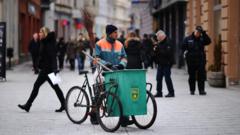In July 1995, more than 8,000 Bosnian men and boys were brutally murdered by Bosnian Serb forces in Srebrenica, and today, the weight of this atrocity continues to cast a long shadow over Bosnia and Herzegovina. The world premiere of the play "Flowers of Srebrenica" at Sarajevo's War Theatre vividly portrays the horror and lingering grief associated with these events, opening a window into the personal and collective anguish felt in the region for nearly three decades.
Srebrenica stands as the most significant wartime crime committed in Europe since World War II, where Bosnian-Serb forces mercilessly overran the town, which was home to many Bosniaks who had sought refuge under the presumed safety of U.N. protection. Instead, Dutch soldiers looked on as General Ratko Mladić ordered the transportation of women and children, while facilitating the systematic slaughter of thousands of men and boys over several days. In an effort to hide their crimes, the perpetrators discarded bodies in mass graves, later exhuming them to scatter remains across various sites, deepening the anguish for families still seeking closure.
The recent premiere event mirrors ongoing societal divides, as memories of the massacre confront the reality of a society still split along ethnic lines. While audiences inside the War Theatre honor the victims, many in the majority-Serb entity of Republika Srpska continue to deny the genocide, complicating the narrative of remembrance and reconciliation. Lead actress Selma Alispahić remarks, “People get tired of proving the truth that's been proven so many times.” Such statements resonate poignantly among audiences suffering from the political machinations that continue to fuel discord in Bosnia.
The Dayton Peace Agreement, which ended the conflict shortly after the atrocities, inadvertently cemented these divisions by establishing ethnic entities that have marginalized the governance and unity of the nation. The actions of Republika Srpska's president, Milorad Dodik, exacerbate these tensions, from legislative maneuvers aimed at disengagement from national institutions to controversial references that evoke the horrific militias of the past.
Current commemorative efforts remind onlookers of a painful history – numerous citizens gathered in the pouring rain in Sarajevo to honor victims recently identified for burial, while contrastingly, in East Sarajevo, scant acknowledgment of Srebrenica's legacy persists. Local political figures, such as Saša Košarac, even claim that remembrance fosters deeper divides rather than aiding in healing.
Despite this political rhetoric, many continue to rally in solidarity with the survivors of Srebrenica, emphasizing the critical importance of support for returning families and the harm inflicted by rising ethnic tensions. As Mirela Osmanović, who works at the Srebrenica Memorial Centre, aptly puts it, “We’re really worried about our future.” The present climate is unsettling for those who remember the violence of the 1990s, suggesting that the path to genuine reconciliation in Bosnia remains fraught with challenges as current leaders weaponize the memory of the past.
For those affected by the Srebrenica massacre, the burden of unresolved grief and the specter of ethno-political games continues to complicate the healing process, stymieing efforts for a unified and peaceful future.
















